
Photo from wikipedia
In a storage ring, turn-to-turn fluctuations in the intensity of spontaneous synchrotron radiation occur due to two mechanisms. The first mechanism is the quantum uncertainty in the number of emitted… Click to show full abstract
In a storage ring, turn-to-turn fluctuations in the intensity of spontaneous synchrotron radiation occur due to two mechanisms. The first mechanism is the quantum uncertainty in the number of emitted photons. The second mechanism is the turn-to-turn variations in the relative positions of classical pointlike electrons in the bunch. We present a unified description of both effects in the framework of quantum optics. We derive an equation for the fluctuations for an arbitrary degree of coherence, which generalizes previously reported results for temporally incoherent radiation. We compare the predictions of our calculation with a previous experiment at Brookhaven National Laboratory, where the latter mechanism was dominant and propose a new dedicated experiment in the Integrable Optics Test Accelerator (IOTA) at Fermilab, where the two mechanisms may have comparable contributions to the fluctuations. Finally, our calculation shows that the magnitude of the fluctuations is rather sensitive to the dimensions and the shape of the electron bunch, thereby indicating possible applications in beam instrumentation. In particular, the small vertical size of the flat beams in IOTA may be estimated via these fluctuations, whereas measurement by a conventional synchrotron radiation monitor is difficult due to the diffraction limit.
Journal Title: Physical review accelerators and beams
Year Published: 2020
Link to full text (if available)
Share on Social Media: Sign Up to like & get
recommendations!